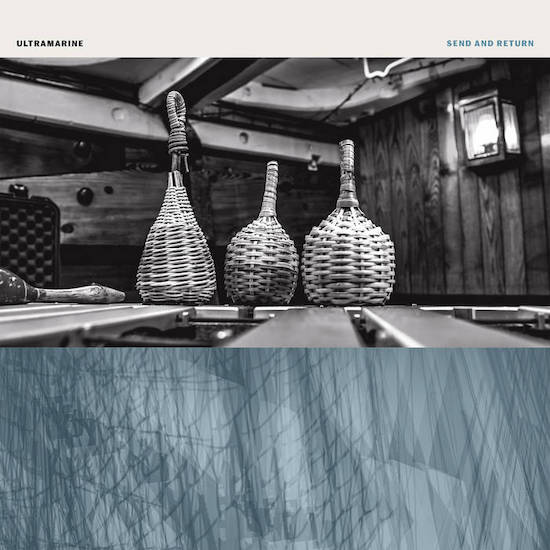Ultramarine are Paul Hammond and Ian Cooper, who having collaborated since the 1980s now release Send and Return, the latest instalment of their ongoing ‘Blackwaterside’ project through Blackford Hill. These six tracks are a sort of musing on Essex’s Blackwater estuary, recorded quite deliciously on a Thames sailing barge, which I am quite envious of.
Now, instrumental music about place is tricky. Music is not language and as much as we like to say otherwise, it resists representational specificity. We can make little sound alike citations of the world but without context they pass by unnoticed. What’s lovely about this release is that Hammond and Cooper cite only ‘moods and movements’ of the estuary itself as source, which allows us as listeners to keep things healthily within the sublime. We might think of ripples, currents, or meanders as musical terms rather than representations of the river, which greatly benefits the listening experience. No specificity is claimed, so we needn’t look for it.
We begin with the seven-or-so beat-driven minutes of ‘Mirosa’, with its vintage groovebox sounds making it feel distinctly nostalgic. Simon Reynolds referred to Ultramarine as “pastoral techno”, which feels like a good fit here. All warmth, and weighty but gentle kicks with subtle syncopation. It bubbles and weaves as watery music should. The following track ‘Xylonite’ is a more curious droning piece with sax, electric piano and delayed guitar. I’m not a fan of this kind of delay, but it is appropriate to its surroundings, and I’m not surprised to find it here. But really, it’s the husky sustained notes and scalic runs of the sax played by Greg Heath that bring this alive. It has that lovely mix of slow laziness and difficult tension that we find in the eddies and flows of rivers.
On ‘Hydrogen’, Ric Elsworth’s vibraphone playing mingles with drum machine and hand percussion to pleasing effect. In the closing third of this track we get a surprisingly aggressive off-beat snare, that arrives with a sort of grating-of-cogs sound that feels like the taught turning of a fishing reel. It’s a small thing, but actually something of a highlight. On ‘Reminder’, we return to more explicitly ambient stuff, with tremolo, chiming vibes, and a liberal use of ‘Strymon Blue Sky’-style modulated shimmer reverb. It’s pretty for sure, but perhaps less inventive than elsewhere on the record. It closes with a gentle jazz-tinted sax section, which is lovely, if that’s your thing.
The closing track ‘Dawn’ begins in a similar but more effective style, with dancing flute, electric piano, and abundant high frequency sounds that sound like the rubbing of the rims of wine glasses. The opening minutes fairly glisten. Again, there is tremolo, but heavier and deeper this time. At about five minutes in they introduce deft filters and a beat drops with that heavy/ gentle kick, pulsing beneath an octave leaping synth sequence and some spacey handclaps.
I think it’s fair to say that as an exercise in sounding the rural in electronica, this is very effective. It is sweet, swelling, jazz-tinged music that successfully conjures those ‘moods and movements’ of the source. As an example of a musical response to a site, it’s pretty convincing, too. It is also mixed beautifully. The balance here shows a great deal of both taste and skill. High frequencies are very present but never grating, the kicks are incredibly satisfying and there is a tangible amount of space and detail throughout. But I can’t help but feel that it’s perhaps a little too clean, too lovely. We get the ripples and reflections, but not the violence, the weight, the churning silt, the erosion. The grit. Both literal and figurative. Don’t get me wrong, this is a beautiful set of tracks, and I’m sure anyone with a taste for clean, well cut, textured, jazz-inflected, ambient electronic music will find enormous amounts to enjoy. I think I just wanted the darkness, too, to really make the light stand out.


